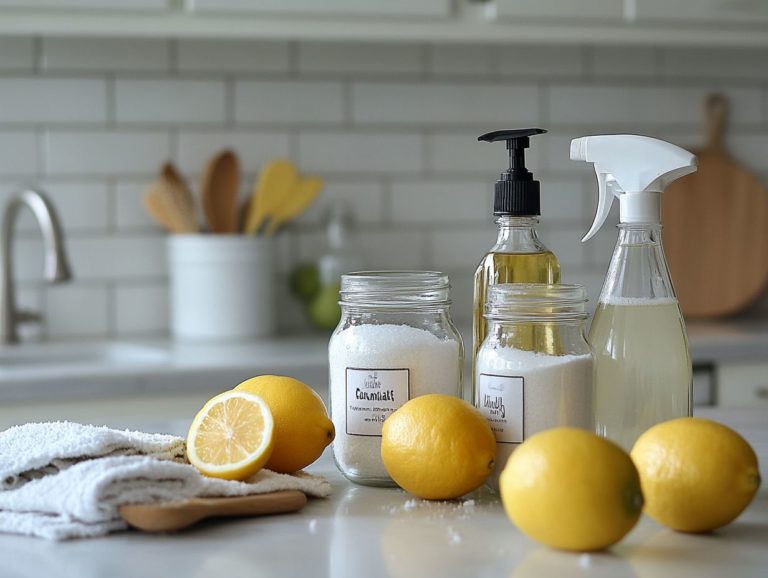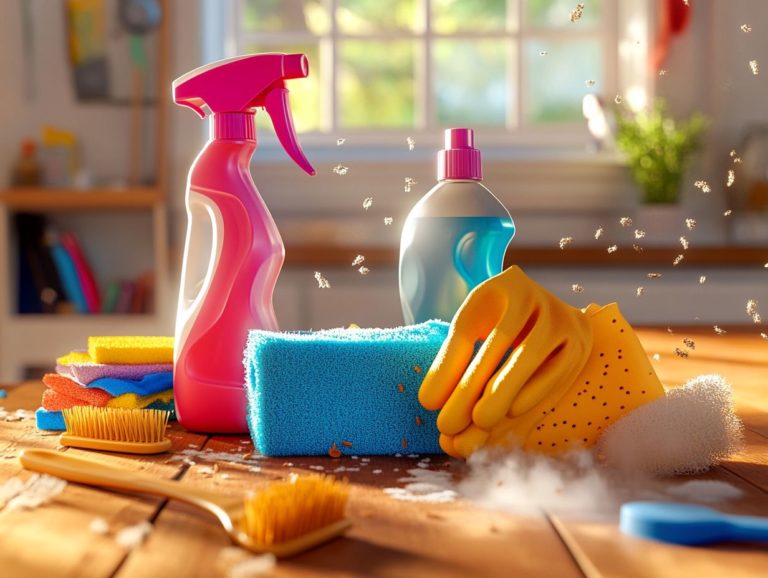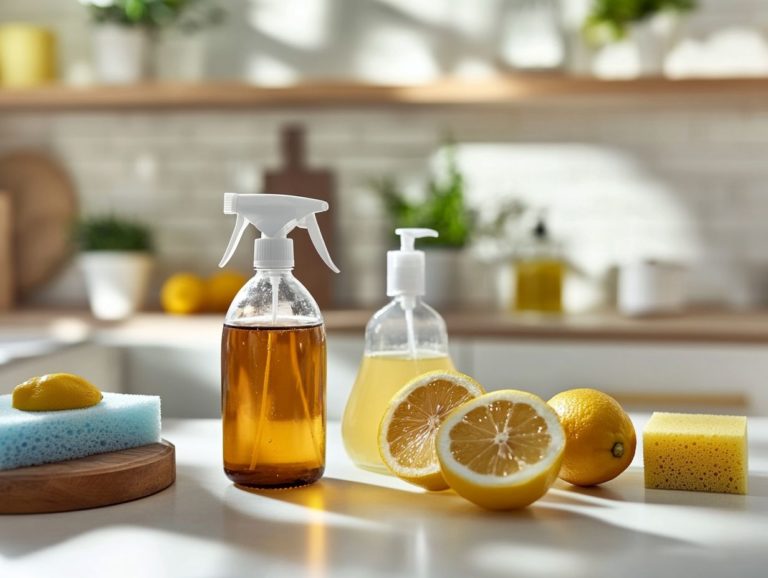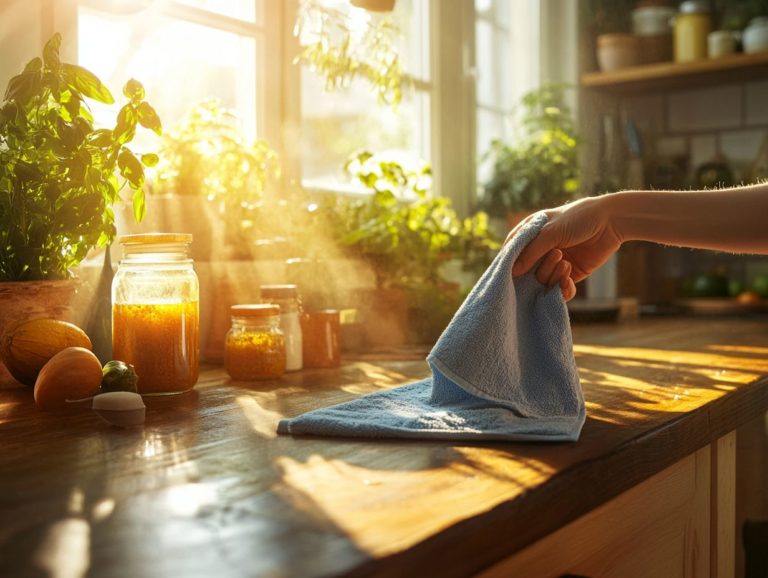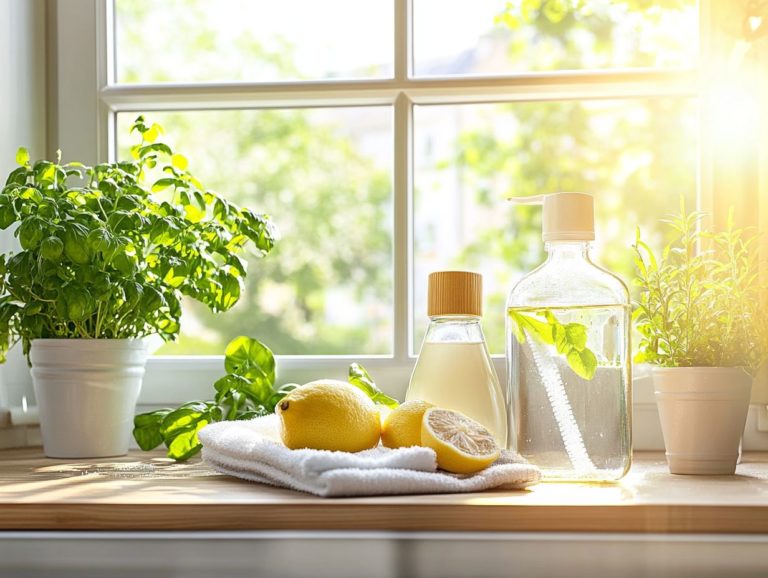How to Store Homemade Cleaners Safely?
In a world that is becoming more and more focused on sustainability and health, homemade cleaning solutions are emerging as a safe and eco-friendly alternative to commercial cleaning products.
By opting for these homemade cleaning solutions, you can significantly reduce your exposure to harsh chemicals, relying instead on simple ingredients like vinegar, baking soda, and lemon juice items you likely already have in your kitchen.
This article delves into the benefits of homemade cleaners, highlights the most common and effective ingredients, and offers essential cleaning tips on how to store them safely and effectively.
Prepare to elevate your cleaning routine with these DIY cleaning solutions!
Contents
- Key Takeaways:
- Why Use Homemade Alternatives?
- What Are The Common Ingredients for Homemade Cleaning Solutions?
- How To Store Homemade Cleaning Mixtures Safely?
- What Are The Dos and Don’ts of Storing Homemade Cleaners?
- 1. Do Not Mix Different Cleaners
- 2. Do Not Store In Unmarked Containers
- 3. Do Not Store In Direct Sunlight
- 4. Do Not Store In High Temperatures
- Frequently Asked Questions
- What are some common household ingredients used to make homemade cleaners?
- How can I safely store homemade cleaners?
- Can I reuse old cleaning spray bottles for homemade cleaning solutions?
- Do homemade cleaning recipes expire?
- What should I do if my homemade cleaner has a strong odor or contains harmful chemicals?
- Are there any special precautions I should take when storing homemade cleaning mixtures?
Key Takeaways:
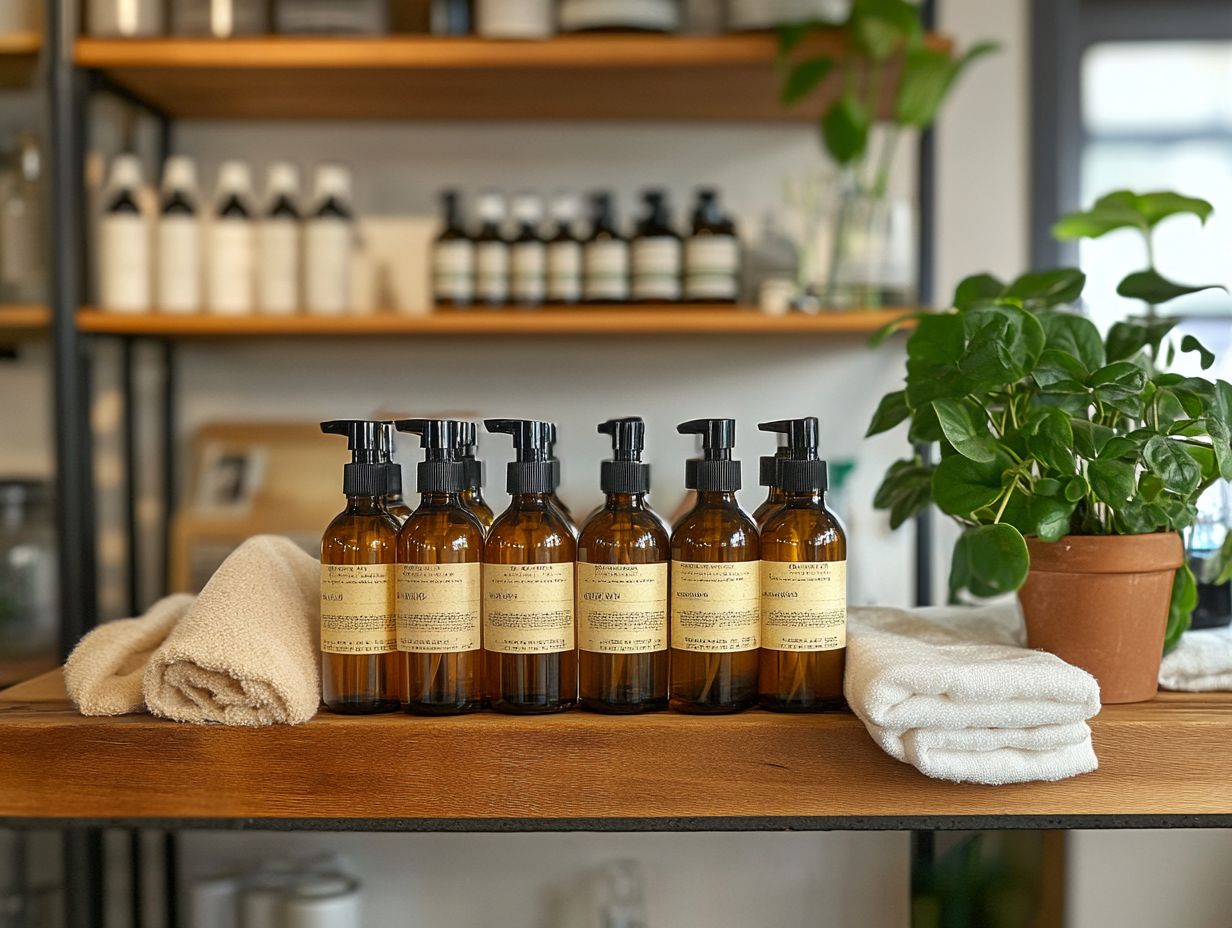
- Use airtight containers to store homemade cleaners to prevent spills and maintain the potency of the ingredients.
- Label containers clearly to avoid confusion and potential accidents.
- Keep homemade cleaners out of reach of children and pets to prevent ingestion or accidental exposure.
Why Use Homemade Alternatives?
Embracing homemade cleaners is a favored choice for environmentally conscious individuals. They want to keep their homes spotless without relying on harsh chemicals.
These DIY alternatives enable you to craft effective cleaning solutions from simple, safe ingredients, all while sidestepping the risks associated with harmful chemicals and indoor air pollutants often lurking in commercial cleaners. From general-purpose cleaners to specific solutions like window cleaner or carpet cleaner, the options are vast and customizable.
By choosing natural cleaning methods, you not only improve your health and protect the environment but also save money in the process.
What Are The Common Ingredients for Homemade Cleaning Solutions?
Homemade cleaners consist of a select few key ingredients that are not only effective but also safe for various surfaces throughout your home. Essentials like vinegar, baking soda, lemon juice, and essential oils offer impressive cleaning power while allowing you to tailor your mixtures to fit your personal tastes and unique needs.
These ingredients can be used to create a wide range of cleaning solutions, including glass spray bottles, wood cleaners, and even oven cleaners.
By grasping the roles of these ingredients, you can craft your own effective cleaning recipes that perfectly align with your household cleaning routine.
1. Vinegar (including Apple Cider Vinegar)
Vinegar is your go-to ingredient, renowned for its exceptional cleaning properties, making it an essential element in many DIY cleaning recipes. Its natural acidity works wonders to dissolve dirt, grime, and mineral deposits, making it particularly effective for surface cleaning in kitchens and bathrooms while also doubling as a disinfectant cleaner.
Vinegar neutralizes odors and tackles tough stains, providing a non-toxic solution that meets all your cleaning needs. Apple cider vinegar can also be used in similar ways, adding versatility to your cleaning arsenal.
Vinegar is celebrated for its ability to combat harmful bacteria and viruses. This makes it a vital ally in health-conscious cleaning. Unlike many commercial cleaners that can be laden with harsh chemicals and potential health risks, vinegar presents a safe alternative for those looking to minimize exposure to toxic substances.
By incorporating vinegar into your cleaning solutions, you not only contribute to a more environmentally friendly cleaning routine but also create a healthier living space, free from the drawbacks often associated with conventional products.
Whether you mix it with water for a gentle surface cleaner or combine it with baking soda for a powerful paste, vinegar s versatility can elevate your natural cleaning techniques, ensuring your spaces remain sparkling clean and thoroughly sanitized.
2. Baking Soda Properties
Baking soda is your go-to, all-natural powerhouse for homemade cleaning solutions. It is remarkable as both a mild abrasive and deodorizer.
It tackles stains, neutralizes unpleasant odors, and can even work wonders as a carpet cleaner. Combine it with vinegar to witness a delightful fizzing reaction that elevates your cleaning game.
Baking soda is essential in your cleaning arsenal for everything from general-purpose cleaners to specific uses like oven or floor cleaners.
This remarkable compound isn t just effective on kitchen counters and sinks; it truly shines in the bathroom. Its gentle exfoliating action eliminates soap scum and hard water deposits.
Its grease-busting capabilities also make it an ideal scrubber for pots and pans. When mixed with essential oils, you amplify the cleaning power while leaving your space infused with a refreshing fragrance.
If you re aiming for eco-friendly DIY alternatives, baking soda shines as a safe carpet deodorizer, soaking up unwanted odors without the harsh chemicals typically lurking in commercial products. Embrace this versatile ingredient, and transform your cleaning routine into a natural, effective experience.
3. Lemon Juice
Lemon juice is not just a culinary delight; it’s also a remarkable natural cleaning agent. Its natural acidity and delightful aroma make it effective for cutting through grease and stains.
As a natural disinfectant, lemon juice is a stellar addition to homemade cleaning solutions. Its citric acid, a natural substance found in lemons that helps clean, creates non-toxic options for various surfaces.
For example, combining lemon juice with baking soda creates a strong paste that effortlessly tackles stubborn stains on countertops and sinks. This mixture fizzles and effervesces, lifting away grime like it s on a mission.
When you mix lemon juice with vinegar, you get an effective bathroom cleaner that slices through soap scum and hard water deposits while leaving your space smelling invigoratingly fresh.
If you’re seeking a natural way to sanitize your cutting boards, just rub half a lemon across the surface. Not only does it clean, but it also imparts a lovely citrus scent.
Get ready to transform your cleaning with lemon juice! Its versatility in cleaning applications makes it an essential ingredient for anyone looking to cultivate a greener home.
Don t wait to make your home cleaner and greener try using baking soda and lemon juice today!
4. Essential Oils for Natural Cleaning
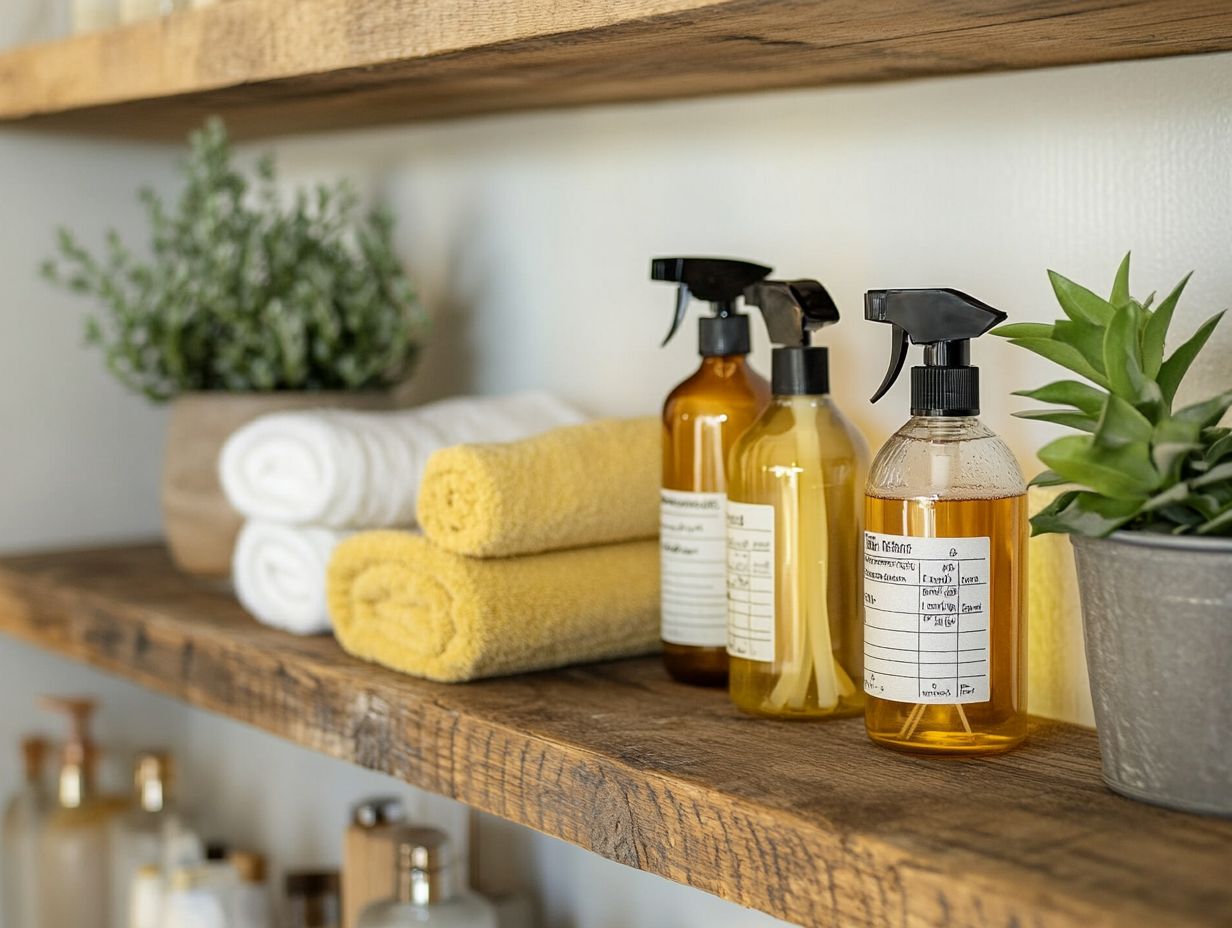
Essential oils are strong plant extracts celebrated for their nice smells and remarkable cleaning benefits. Oils like tea tree, lavender, and eucalyptus not only infuse your space with delightful fragrances but also boast antibacterial and antifungal properties. This enhances the effectiveness of your non-toxic cleaning solutions.
By incorporating essential oils into your cleaning products, you elevate your cleaning experience while fostering a healthier indoor environment. Their use is highly recommended by cleaning experts for their natural properties and effectiveness in cleaning tasks.
These fantastic natural solutions not only smell amazing but also work wonders! For example, lemon essential oil is famous for its grease-cutting prowess, making it an outstanding choice for kitchen cleaners. Meanwhile, peppermint oil can invigorate your senses and act as a natural insect repellent when included in your household cleaning arsenal.
Essential oils can also be used to create a wide range of cleaning solutions, from window cleaner to wood cleaner. This enhances the versatility of your homemade cleaning recipes.
Using these oils helps you avoid man-made cleaning products, which aligns with eco-friendly practices and promotes better indoor air quality. This approach supports a cleaner, greener lifestyle. Cleaning experts advocate for natural solutions to maintain a healthy home environment.
How To Store Homemade Cleaning Mixtures Safely?
Storing your homemade cleaning mixtures safely is essential to maintain their effectiveness and prevent any potential hazards, especially when using natural ingredients. Follow safe storage tips to keep your DIY cleaners effective.
Use glass spray bottles or containers that seal tightly to preserve the integrity of your cleaning solutions. This shields them from contamination and extends their shelf life. Proper storage techniques are crucial for ensuring your cleaners stay fresh and effective.
It’s also important to understand how to store these cleaners properly. Keeping them away from direct sunlight and high temperatures will enhance their safety and reliability, ensuring they are always ready to tackle your cleaning tasks. Always store your homemade cleaners properly to keep your home safe and clean!
1. Use Airtight Containers
Using airtight containers is crucial for storing your homemade cleaning solutions, as it effectively prevents air exposure that can impact the stability and efficacy of the ingredients. When you seal your cleaning mixtures in airtight containers, you not only shield them from contamination but also preserve their potency for extended periods. This ensures that your cleaning products are always ready to perform when you need them.
This method is highly recommended for storing various types of DIY cleaning solutions such as general-purpose cleaners, floor cleaners, and disinfectant cleaners.
The significance of airtight containers cannot be overstated, particularly when you consider the careful mix of natural ingredients in these cleaning concoctions. Air exposure can lead to oxidation, a process that can weaken your cleaning products, diminishing the power of essential oils and other active compounds. Unsealed containers are vulnerable to moisture and external contaminants, both of which can compromise the integrity of your mixtures. This is especially important for maintaining the efficacy of non-toxic cleaning recipes created from safe ingredients.
By adopting proper storage techniques with airtight sealing, you can effectively extend the shelf life of your homemade cleaners, guaranteeing they remain reliable and safe for use throughout your home. This practice not only keeps your home safe but also helps you avoid harmful chemicals found in many commercial cleaning products, aligning with your commitment to natural cleaning techniques.
2. Label the Containers for Safety
Labeling your cleaning product containers is an essential step in ensuring both safety and organization within your cleaning routine. By clearly marking each container with its contents and usage instructions, you can effectively prevent accidental misuse, particularly when dealing with potent ingredients like essential oils or vinegar. Labeling enhances safety. It also streamlines your cleaning process, allowing for quick identification of your homemade cleaning solutions.
Creating effective labels requires you to use clear, concise language and easily readable fonts. It s wise to include hazard symbols or safety warnings where necessary, especially for products containing bleach or ammonia.
Consider adopting a color-coding system for your labels based on cleaning tasks perhaps one color for kitchen supplies and another for bathroom cleaners. This approach serves as a helpful visual cue that aids in organization and provides an immediate reference for safe storage practices, ensuring that all cleaning products are stored responsibly and kept out of reach of children and pets.
Make it a habit to review your labels regularly as products are replenished or recipes change. This will further enhance safety and maintain an efficient cleaning strategy.
3. Keep Away From Children And Pets
In terms of storing your homemade cleaners, it s vital to keep them away from children and pets to prevent any potential accidents or exposure to harmful ingredients. Even though your homemade cleaning products often boast safe ingredients, securely storing them out of reach is essential to avoid any mishaps. Act now to secure your cleaning supplies! Keeping them out of reach is crucial to prevent any accidents.
Consider implementing safety measures like using child-resistant lids, which are designed to be hard for kids to open, or placing cleaners in elevated areas to significantly reduce risks.
Utilizing cabinets with locks or magnetic closures adds an extra layer of protection, ensuring that curious little hands and paws can t access these cleaning solutions. Organizing your cleaning supplies in a designated area, preferably high up and out of sight, reinforces the importance of safety.
Make it a habit to review the contents of your cleaning kit; this allows you to safely dispose of any expired mixtures, further minimizing hazards. Research on safety suggests that taking proactive measures in storage not only protects your loved ones but also fosters a responsible approach to homekeeping.
4. Store In A Cool, Dry Place
Storing your homemade cleaners in a cool, dry place is essential for maintaining their effectiveness and extending their shelf life. Environments with fluctuating temperatures and humidity can adversely affect the stability of the ingredients, which can diminish cleaning properties or cause spoilage.
Select a designated storage area that protects your DIY cleaning solutions from heat and moisture to ensure they remain effective over time.
Consider placing your cleaning solutions in a dark cabinet, away from direct sunlight, as UV rays can alter their composition. It’s also wise to use labeled, airtight containers to prevent contamination or evaporation. Look for storage spaces such as a laundry room or basement, where temperatures tend to be more stable.
Keeping an inventory of your cleaning products allows you to monitor their freshness. This ensures you always have reliable and safe cleaning solutions at your fingertips when you need them.
What Are The Dos and Don’ts of Storing Homemade Cleaners?
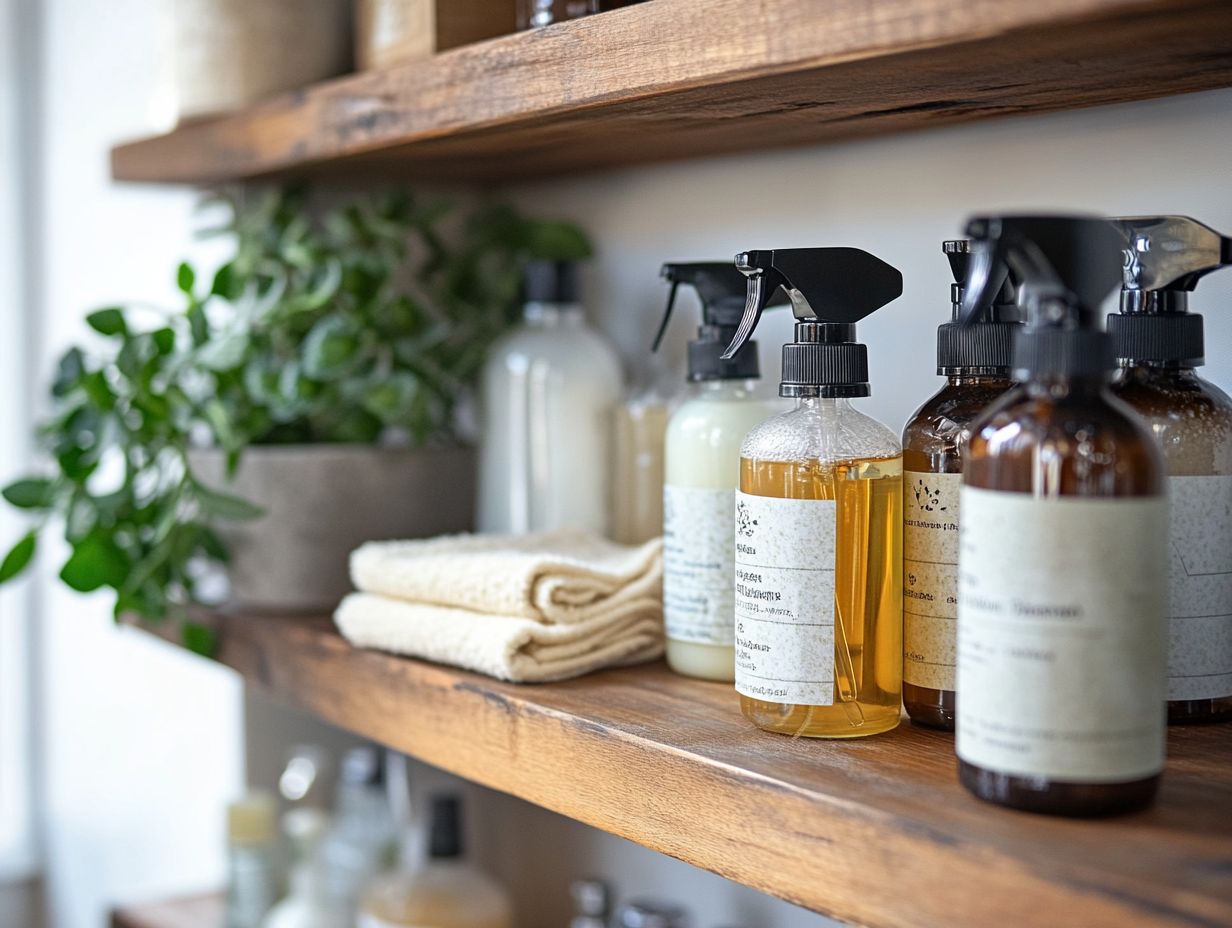
Understanding the dos and don’ts of storing your homemade cleaners is crucial for maximizing their effectiveness and ensuring the safety of your household. By adopting proper storage practices, you can extend their lifespan and minimize the risks associated with mishandling or improper ingredient combinations.
Embracing these best practices will help you tackle any cleaning questions confidently.
1. Do Not Mix Different Cleaners
One of the critical dos and don’ts of storing your homemade cleaners is to never mix different cleaners. Mixing cleaners can create dangerous situations. Stay safe by using one cleaner at a time.
For instance, while combining vinegar with baking soda might produce a harmless fizz, mixing either with other cleaning products like chlorine bleach can release harmful gases. It s essential to understand the potential reactions between various ingredients to ensure your safety while cleaning.
Take the mix of bleach and ammonia, for example; it can produce toxic chloramine vapors that pose serious health risks, including respiratory issues and irritation. Similarly, combining hydrogen peroxide with vinegar creates peracetic acid, a strong disinfectant that can harm surfaces and be dangerous if inhaled in large amounts.
Safety research consistently emphasizes the importance of using cleaning solutions as directed and separately to avoid these chemical reactions. To keep your cleaning tasks safe and effective, it s advisable to always read labels for specific warnings about incompatible ingredients.
2. Do Not Store In Unmarked Containers
Storing homemade cleaners in unmarked containers can lead to serious accidents. Without proper labeling, identifying the contents and their intended uses becomes a challenge, which can lead to accidental misuse or the disastrous mixing of incompatible ingredients.
To maintain safety and effectiveness in your cleaning routine, it’s crucial to ensure that your containers are clearly labeled with their contents and any relevant precautions. This is particularly important because some homemade cleaners can react dangerously when combined with certain substances. For more detailed guidance, check out our tips on how to store your cleaning products safely.
Implementing a thoughtful labeling system will help mitigate potential safety risks. Consider using waterproof labels and permanent markers to not only list the ingredients but also highlight specific safety warnings. For example, make it clear if a cleaner should be kept out of reach of children or pets, and provide details on proper storage conditions.
Research in safety practices emphasizes that clear labels do more than just inform users; they also prevent accidents. Organized storage becomes an essential strategy for anyone using homemade cleaning products, ensuring a safer and more efficient cleaning experience.
3. Do Not Store In Direct Sunlight
Storing your homemade cleaning solutions in direct sunlight can seriously compromise their effectiveness and safety. Those pesky UV rays can degrade certain ingredients over time, diminishing their cleaning power and potentially causing changes that can happen between different ingredients. To keep your homemade cleaners at their best, always opt for storage locations that are shielded from direct sunlight and maintain stable temperature conditions.
Consider the environment where you keep your cleaning products. Ideal spots are cabinets or closets that are cool and dry. Steer clear of areas prone to heat fluctuations, like the space near your oven or washing machine.
Using opaque containers protects your cleaners from light exposure, further preserving their potency. Be sure to regularly check the expiration dates on your solutions and ensure they re tightly sealed to prevent contamination.
By taking these simple precautions, you ll ensure that your cleaning solutions work their very best when you need them most!
4. Do Not Store In High Temperatures
High temperatures can significantly undermine the quality and effectiveness of your homemade cleaners, so it s essential to avoid storing them in hot spots like near stoves or in stuffy corners. Excessive heat can cause the ingredients to degrade, leading to diminished cleaning power or, worse, the creation of harmful compounds. To keep your DIY cleaning solutions both safe and effective, always opt for a cool, stable environment for storage.
Aim to store these cleaning products in shaded, temperature-controlled areas, ideally maintaining a range between 50 F and 70 F. Direct sunlight and humidity can compromise the integrity of your carefully selected ingredients.
Using opaque containers is another smart move to shield your solutions from light exposure. As you explore safe practices for your homemade cleaning solutions, remember that optimal storage conditions are paramount to preserving both the efficacy and safety of your cleaning arsenal. By adhering to these 5 tips for storing homemade cleaning products, you can ensure that your DIY solutions remain potent, effective, and safe for everyday household use.
Frequently Asked Questions
What are some common household ingredients used to make homemade cleaners?
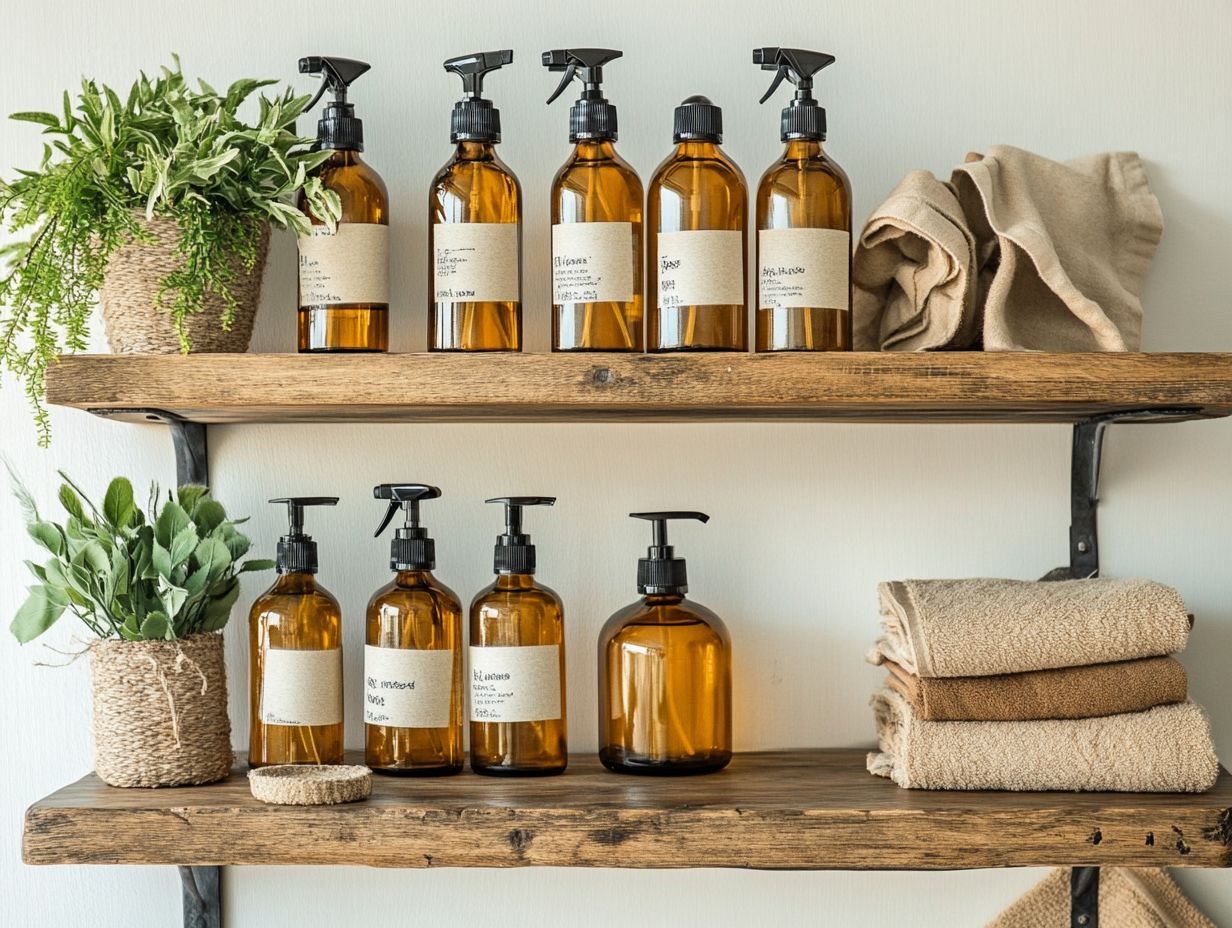
Common household ingredients used to make homemade cleaners include vinegar, baking soda, hydrogen peroxide, essential oils, and lemon juice.
How can I safely store homemade cleaners?
It is important to store homemade cleaners in a cool, dry place away from direct sunlight. Ideally, they should be kept in a locked cabinet or out of reach of children and pets.
Can I reuse old cleaning spray bottles for homemade cleaning solutions?
Yes, you can reuse old cleaning spray bottles or glass spray bottles for homemade cleaning solutions as long as they are thoroughly cleaned and labeled with the contents inside. This helps ensure the safety of your homemade alternatives.
Do homemade cleaning recipes expire?
Yes, homemade cleaning recipes can expire. It is important to check the expiration dates of the ingredients used, such as vinegar, baking soda, or essential oils, and to use the cleaner within a reasonable timeframe. This ensures the effectiveness of your DIY solutions.
What should I do if my homemade cleaner has a strong odor or contains harmful chemicals?
If your homemade cleaner has a strong odor, it is recommended to store it in a well-ventilated area or dilute it with water. You can also add a few drops of essential oils to help mask the smell. Avoid using toxic cleaners or chemical-based cleaners to reduce indoor air pollutants and health issues.
Are there any special precautions I should take when storing homemade cleaning mixtures?
Yes, it is important to label all homemade cleaning mixtures with their contents and to keep them out of reach of children and pets. If possible, store them in a designated area away from food and cooking utensils. This is especially important if your cleaning mixtures contain natural ingredients like vinegar, lemon juice, or castile soap, as well as to prevent accidental ingestion of cleaning solutions.

